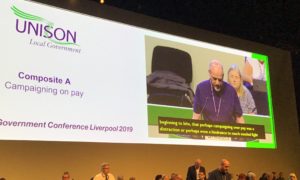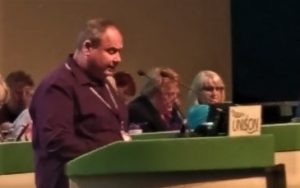
Local Government Conference paid tribute to Scotland’s local government pay campaign and pledged to learn lessons from what worked in that and other successful campaigns that saw the 1% pay cap smashed.
Two Scottish motions were composited and moved by Arthur Nicol of the Scottish Joint Council Committee. He told conference that this is not just a clap on the back for Scottish LG, “Although we are largely proud of what we achieved in last year’s campaign.
“It is an attempt to promote debate on how we successfully conduct campaigns on Pay in the current and future climate.”
He described the Scottish Local Government pay campaign and what worked. He pointed to our prioritisation of member and activist engagement whilst collating members’ contact details, to be ready to ballot with minimum data cleansing.
“So it was a twin strategy of building pessure on the employers and the Scottish Government while also building engagement and anger within our members and getting strike ready,” said Arthur.
“The organising, recruitment and confidence boost that have come from the campaign are already feeding into wider localised fights over conditions, cuts and redundancies. We intend to continue to build on this work and hope the wider union can also draw lessons from it.”

Seconding, Jane Aitchison from South Lanarkshire Branch echoed that the Scottish campaign included a mixture of traditional campaigning tactics as well as a number of fresher tactics that we had not utilised before.
She also pointed to an unprecedented engagement with our members “which got our message over, encouraged them to take small actions like sending postcards and increased on each occasion the involvement of members in the campaign.
“It was ultimately successful in securing the turnout in the consultation ballot and the final, improved offer that members voted to accept.”
Jane added that our campaign was developed learning lessons from past pay campaigns.
“This time we focussed on the engagement of and participation of our members. We increased that engagement and participation at each step. This raised the profile of our campaign and of the union in workplaces and we recruited many new members.”
She spoke to the need for campaigns to have the possibility of industrial action “not as the first and only tactic we discuss with members but something that we work up to and deliver when the members are both convinced it is the right tactic and they are prepared to take that step.”
“Our next campaign will be better than the last,” warned Jane, “And it starts now.”

Dundee’s Jim McFarlane spoke in support and told delegates that the one thing the latest Tory anti- union law has done is force us to up our game in how we engage with members when it comes to ballots.
He spoke of Dundee UNISON’s success in achieving a return of 60% in the consultative ballot for pay – the highest turn-out in Scotland – and the actions they took to engage members.
“Building our activists base should be the foundation for action. If we give a lead at national, regional and branch level then members can have the confidence that we are serious about winning on pay,” urged Jim.

Speaking in support from the Service Group Executive, Mark Ferguson said that it is vital that we share our experiences and learn from successful campaigns that have delivered improved outcomes for our members.
He too highlighted the key importance of membership engagement and participation and supported the call for a new organising strategy to equip members at local level to make the case with employers, elected members and the public, including a clear communications strategy to keep members informed.
“In order for any campaign to be successful we must all pull together, despite any differences, if we are to strengthen the resolve of our members,” urged Mark.
